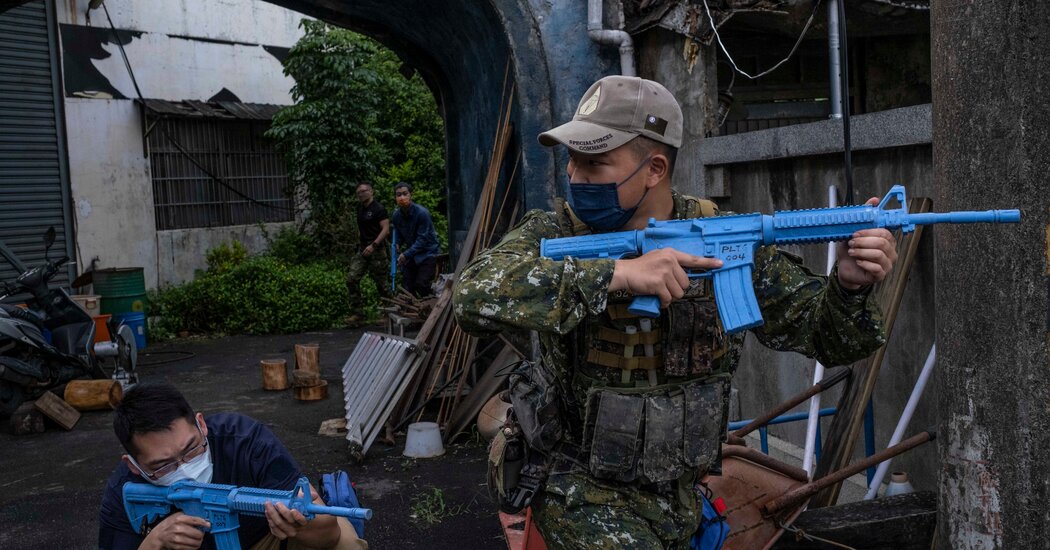Taiwan has spent more than seven decades under the threat of an invasion: China sees the island as a breakaway part of its territory. In the months since Russia invaded Ukraine, Taiwanese citizens have come to view a Chinese incursion as a more serious possibility than ever. My colleague Amy Qin, who’s based in Taipei, Taiwan’s capital, recently reported on how the island is preparing. I called her to learn more.
Why would an invasion half a world away cause concern for people in Taiwan?
I cannot emphasize enough how baked into the Chinese psyche it is that Taiwan is part of China. Even the most anti-Xi Jinping, anti-Chinese Communist Party, flaming liberal Chinese intellectuals will tell you that Taiwan is part of China. It’s very rare to meet someone who doesn’t believe that. It would be as if you told me that Maryland or Florida wasn’t a part of the U.S. If you look at Chinese foreign policy through the decades, Taiwan has always been its top issue. Xi, China’s leader, has a specific vision for what he thinks a great China means, and Taiwan is part of that.
People in Taiwan have known that for a long time, but Ukraine woke up people here to the idea that what seemed like a distant threat could actually happen. Taiwan and Ukraine are very different, but there are parallels. You have strongmen leaders who see these territories as key to their nations. You have this vast power imbalance in terms of military and territory. After Russia invaded, it was natural for people here to make that comparison.
How have residents responded to that heightened sense of threat?
A growing number are taking matters into their own hands. Taiwan has a strong civil society, and more and more nongovernmental organizations are holding what are called civil defense workshops. I went to one in Taipei recently in a sleek co-working space. This organization, Kuma Academy, gives classes focused on subjects like first aid and Chinese disinformation. About 40 people of different backgrounds and ages gave up their weekends to listen to lectures on to like combating misinformation and to learn practical skills like how to use a bandage to stop bleeding. Everyone was listening intently and taking notes on their laptops.
How popular are these kinds of preparation activities?
Demand has really gone up. The founder of another civil defense organization, Forward Alliance, told me that it has been doing 15 to 20 classes a month since Russia invaded Ukraine. Classes fill up within two hours of going online. He said his group has trained 1,000 civilians and emergency medical workers. People are taking their kids to learn first aid.
It’s gone beyond first aid, too. Taiwan has really strict gun laws, but interest in classes teaching people how to shoot has also tripled since the war began.
But this is an island of 24 million people, so the people attending these classes are not necessarily a huge percentage of them. That’s why military analysts and former Taiwanese officials think training civilians to get involved in the island’s defense needs to be a top-down government initiative. Right now, it’s just a patchwork of grass-roots NGOs.
You reported about how the government does want to involve civilians in strengthening the island’s defenses. How are its efforts going?
The government hasn’t said much about how it plans to get civilians more involved. In April, officials did issue a handbook for civilians about what to do if China attacks, and it got instantly panned. One recommendation was to scan a QR code for information if an attack happens. But a lot of people think that one of the first things China is going to do if it attacks is cut off critical infrastructure. People were saying, “There won’t be internet, so how are we going to be scanning QR codes?”
Taiwan’s government is trying to figure out what lessons it can take from Ukraine’s defense. But Ukraine really only started its most impactful military reforms after Russia annexed Crimea in 2014. The question is whether Taiwan can make meaningful changes without having to go through a similar event. Taiwan is a democracy, and politicians have electoral considerations. Extending military conscription, for example, would probably not be very popular.
We’ve seen a strong Ukrainian national identity emerge since Russia invaded Crimea. It’s only grown during the invasion and seems to be helping buoy Ukrainian troops. Has anything similar occurred in Taiwan?
There’s a growing sense of a Taiwanese identity that’s defined in opposition to China. It’s apparent especially among young people who were born in Taiwan and don’t identify as being Chinese, even if their parents or grandparents were born there. That’s continuing to harden as China becomes more aggressive.
More on Amy Qin: She grew up in Northern California and studied Chinese politics at the University of California, Berkeley, and Oxford University. Her family is from China’s Shaanxi and Sichuan provinces, where she spent summers as a child. She previously reported from Beijing and was one of several Times reporters expelled from China in 2020.
Lives Lived: The commentator Mark Shields delighted and rankled audiences with piercing analysis of America’s political virtues and failings. He died at 85.



